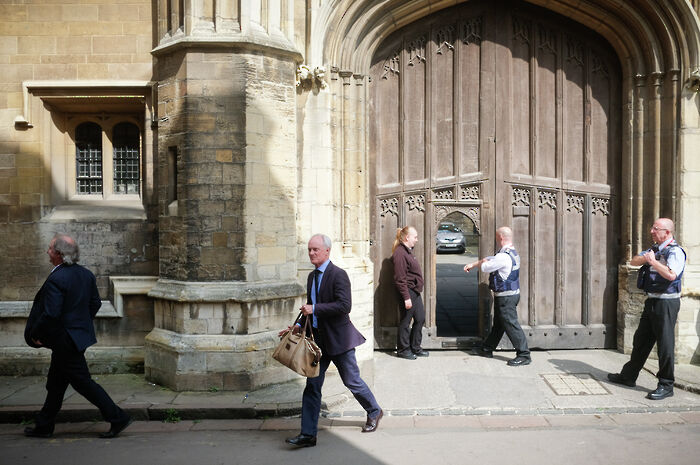Cambridge Extinction Rebellion highlights global ‘criminal inaction on climate breakdown’
Rather than focussing on individual choices, the group’s direct actions “seek to target a system that doesn’t allow us to live in a more ecologically balanced way”

“By failing to tackle climate change in a meaningful way, the social contract is breaking”, says Nathan Williams of the Cambridge branch of Extinction Rebellion. On the 31st of October 2018, the new environmental group declared the beginning of a campaign of mass civil disobedience in response to “the UK Government’s criminal inaction on climate breakdown.”
Their message is one of urgency, and focuses on the threat that our “voracious appetite for resources as a globalized economy” is posing to the planet’s ecosystems and, by extension, many species, including humans. Human extinction, they argue, is a possibility, but the grief of this realization can, in fact, empower people to take action to prevent it.
The group emphasises how tactics of nonviolent civil disobedience and the readiness of its members to be arrested have gained them considerable attention. In November, 85 people were arrested after thousands blockaded five of London’s bridges in a protest built on the argument that the government’s failure to act in protection of the future means that the people are therefore “under no obligation as a citizenry to obey.”
Inclusivity is an important aspect of these actions, Williams says, and the events organized so far have been attended by people of all ages. This is all a part of Extinction Rebellion’s philosophy of ‘regenerative culture’, a way of bringing individuals and groups within the community together to participate in direct action. He cites these tactics as one of the key reasons for the group’s success thus far: “the way that we can win is by taking to the streets and building a non-violent direct action movement that clearly comprehends the enormity of the crisis.”
Extinction Rebellion’s mission, however, goes beyond just climate activism, and its reach extends considerably further than the UK. Their focus is not just on environmental issues and they seek to work with a broad range of justice-oriented groups. Climate change, they argue, is a result of “a destructive economic system that has injustice, oppression ingrained within it” and so to change this they acknowledge a need to “fight all of those systemic mechanisms that are oppressing people and making the world increasingly unequal.”
Their approach avoids criticizing individuals or making people feel guilty about their consumption or the choices they make on a day to day basis. Instead, they seek to target, as a whole, “a system that doesn’t allow us to live in a more ecologically balanced way.”

In April 2019, efforts will be extended internationally, with branches around the world temporarily coordinating their actions in what Williams predicts will be a mass mobilization effort “unlike anything the environmental climate movement has seen before.”
This systemic focus is reflected in the group’s aims and its own internal organization. Part of their efforts to address government failures to tackle the climate crisis is an insistence on the democratization of the decision-making process when it comes to finding solutions.
“Top-down, uninclusive decisions don’t work”
Extinction Rebellion proposes citizen assemblies to ensure the involvement of the people in confronting a problem which is likely to directly affect them. Just how this would work in practice, notes Williams, is, as of yet, uncertain, but what is clear is that “top-down, uninclusive decisions don’t work.”
Within Extinction Rebellion itself there exists very little, if any, hierarchy. The group has three demands: government honesty about the urgency of the crisis, a commitment to reducing the UK’s carbon emissions to net zero by 2025 and a wartime-like mobilization, to be democratically overseen by citizen bodies. As long as the different branches of the organization adhere to these goals, and comply with the principle of nonviolence, they are free to exist with extensive autonomy.
The Cambridge branch has had, therefore, great freedom in determining city-specific goals and designing action through which to forward them. Ultimately, Extinction Rebellion Cambridge seeks the declaration of a ‘Climate Emergency’ by local authorities, a move which would make it easier for them to push for clean-energy solutions and to hold government to new environmental standards in any building and infrastructure projects it might embark on. Plans for city expansion are not, Williams comments, the “vision of prosperity” that they’re marketed as, but rather are a “vision of destruction”, likely to further concentrate wealth at the top of society and lead to continued ecological damage.
Extinction Rebellion Cambridge is also seeing increasing student involvement, and representatives of the group have attended recent Zero Carbon Society meetings. The group also supports the ongoing University divestment initiative, and stands with the student movement. The longer the university waits to divest, says Williams, “the longer they show themselves up as not really understanding what the future looks like.”
The group hopes to work and mobilize in conjunction, with student campaigns to reach this end sooner. Divestment is “absolutely inevitable”, insists Williams, if the University wants to end up “on the right side of history.”
 News / Caius mourns its tree-mendous loss23 December 2025
News / Caius mourns its tree-mendous loss23 December 2025 News / Cambridge welcomes UK rejoining the Erasmus scheme20 December 2025
News / Cambridge welcomes UK rejoining the Erasmus scheme20 December 2025 News / CUP announces funding scheme for under-represented academics19 December 2025
News / CUP announces funding scheme for under-represented academics19 December 2025 News / King appoints Peterhouse chaplain to Westminster Abbey22 December 2025
News / King appoints Peterhouse chaplain to Westminster Abbey22 December 2025 Interviews / Politics, your own way: Tilly Middlehurst on speaking out21 December 2025
Interviews / Politics, your own way: Tilly Middlehurst on speaking out21 December 2025








